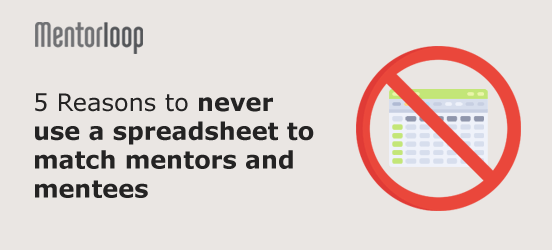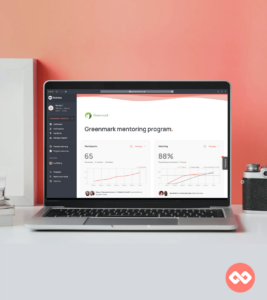Great mentoring starts with great matches, right? And in the past, many mentoring program coordinators used spreadsheets for matching mentors and mentees. So, let’s talk about the ubiquitous spreadsheet. It does a lot of things amazingly well and can be leant on in both good times and bad – for almost anything. Almost anything.
One thing spreadsheets shouldn’t be used for is matching mentors and mentees.
In fact, while Mentorloop’s matching tools were designed to be a core element of a fully integrated mentoring platform (which does everything mentoring-related well) – they were also largely designed to simply usurp the spreadsheet, which we simply couldn’t keep letting people use for matching mentors and mentees – for the benefit of everyone.
The rise and increasingly frequent adoption of mentoring software is testament to the fact that using spreadsheets and emails to match mentors and mentees just didn’t – and doesn’t – quite do the job.
But there are still plenty of mentoring programs out there in the world which rely on manual matching methods including spreadsheets, sticky notes, and plain old paper.
While at times it can be scary to give up what you know for something new, and move from trusty spreadsheets to software platforms, here are 5 reasons you should save the spreadsheet for those other data-driven tasks – and adopt mentoring software for the very human task of mentor-mentee matching.

1. Humans are the ultimate multivariables.
Ever met a person and just not quite clicked? Maybe they are very similar to people you genuinely enjoy being around, but there’s one variable that’s different.
Humans are infinitely complicated creatures, with very complex personality traits, preferences, and everything in between. While a spreadsheet may seem like a useful tool to organize and filter data, it fails to capture the complex and dynamic nature of human relationships. Trying to match mentors and mentees using a spreadsheet may oversimplify the process and doesn’t give you the scope or flexibility required to make matches across experience, skills, personality, preferences, and relationship goals. Not while staying sane anyway.

*note: unsolved ^
Thankfully, there are now more advanced mentoring software options like Mentorloop available that can help to facilitate the process. Mentorloop uses an equitable matching algorithm to pair mentors and mentees based on their interests, goals, and skills. It takes into account the unique characteristics of each individual to suggest the best match for each person. And instead of going through a list of participants making the best matches for those that go first and leaving the last ones on a list with inferior matches, Mentorloop considers the match quality across your cohort, increasing the chances that everyone in your program has a great match and a great experience.
Mentoring software matching, on any platform, isn’t perfect. But it does give you far more flexibility and scope in deciding who should be matched on what criteria, and how many criteria. It also brings a human element to the coordinated matching. Rather than writing an Excel function, you can oversee the matches, and make changes and use your intuition and understanding where possible.
2. What do you do before and after the spreadsheet?
It’s not just about matching with a spreadsheet. It’s about how that spreadsheet then ‘plugs into’ all the other components of your mentoring program (Spoiler Alert: it doesn’t)
The spreadsheet is a bottleneck for your program. Even if/when you do get your mentors and mentees matched correctly, you’ll have to start again after that step and manually reach out to each and every pairing to let them know about their match – or worse, share the spreadsheet for all to see so that everyone can judge your pairings. 😬
Software platforms are beautiful in that your entire program can live in one place – from beginning to end – from onboarding to reporting. Mentorloop offers a range of features to support the entire mentoring process, from recruitment to assessment to scale. With scheduling tools, progress tracking, and communication platform integrations, among others, Mentorloop streamlines the process and makes it more effective and efficient for both mentors and mentees, as well as program coordinators.
3. Admin, admin, admin
We have had many conversations with a lot of mentoring program coordinators, a lot of whom do run their programs manually. The common thread? It’s a hassle and a half. It takes a lot of time and effort, unnecessary effort at that. Spending time rearranging sticky notes or Excel cells doesn’t add any value to your mentoring program. It simply adds admin burden and admin time – which no one wants to do nor probably has time for.
Getting rid of annoying and time-consuming admin, and freeing yourself up for important stuff which can’t be automated or simplified with software, such as targeted support, is the best way to ensure you have a successful mentoring program.
4. Scale, scale, scale
Mentoring works best at scale. It works best when your program spans large departments or your entire organisation, and when you build a culture of mentoring where everyone is learning, sponsored, and supported.
So, program coordinators should always be looking to scale their mentoring offerings. Having said that, it is so difficult (nearly impossible, really) to scale a mentoring program using manual matching methods. You can’t begin to match 5,000 mentors and mentees with any confidence using a spreadsheet. The manual effort involved in entering and sorting data on a spreadsheet, as well as the potential for human error, makes it near-impossible to scale this method effectively. As the number of participants increases, the amount of data to be entered and sorted grows exponentially, making it increasingly difficult as your program scales.
Program coordinators’ desire to scale mentoring offerings shouldn’t be inhibited by admin to the detriment of 80% or 90% of your people. People who may also want to pursue mentoring relationships but can’t get into an already full program.
Fortunately, there are mentoring software solutions available that can help to streamline the matching process and enable more efficient and effective pairings. Making use of mentoring software means you can offer mentoring to more people because you don’t have to worry about being unable to conduct the matching for mentors and mentees with a spreadsheet. Instead, mentoring software like Mentorloop allows you to match at scale and you can focus on more important jobs. And, if you think algorithmic matching isn’t for your cohort, that’s still no reason to use a spreadsheet. Mentorloop helps you with other matching tools like Self Match, which requires no effort on your part (bonus!) and empowers your participants to make their own matches, and Manual Match, which allows Program Coordinators to make matches themselves assisted by the Mentorloop algorithm. Both make things infinitely easier and more scalable than a spreadsheet.
As an additional bonus, the benefits of using mentoring software like Mentorloop don’t stop at matching. Mentorloop offers a range of features and tools to support the mentoring relationship throughout its duration. These features include scheduling tools, communication platform integrations, progress tracking, and data analytics, which can help mentors and mentees to stay organized, stay on track, and make the most out of their mentoring relationship.
5. Mentoring deserves more than the spreadsheet credit it’s getting
Mentoring is an incredibly powerful tool for individuals and organisations. A good mentor really can change a life, and enough great mentorship can transform an organisation.
Using a spreadsheet and other piecemeal solutions to run your mentoring program signals to your people and your bosses that mentoring isn’t something worth investing in. It shows a lack-of buy-in at every level of the organisation. And if you underinvest in your mentoring program, your mentoring program will be under-utilised and ineffective.
Great mentoring starts with great matches. And great matches aren’t created with a spreadsheet.
We still love you, spreadsheets. Just not for this. 🫶
Keen to build your best mentoring program yet? Learn more about Mentorloop by booking a demo or, if you’re ready to build right now, dive straight in!




